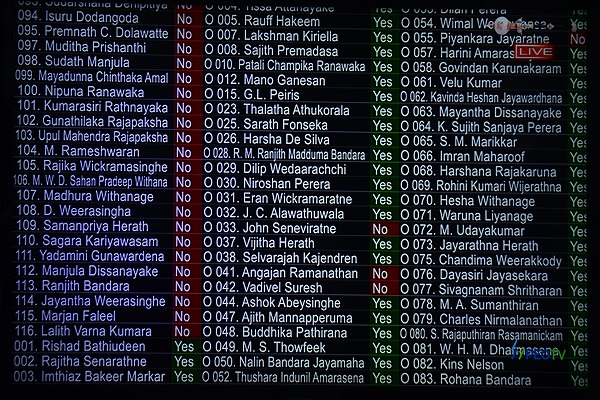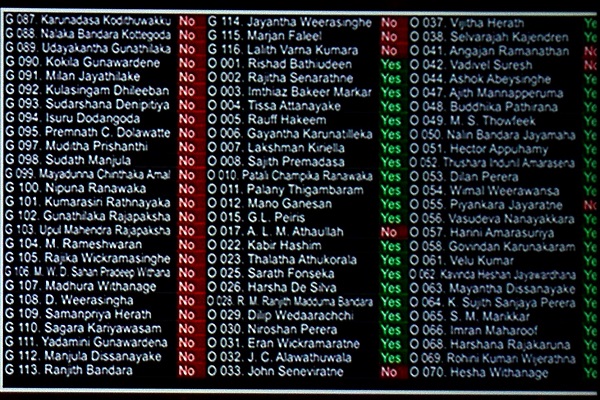Speaker Mahinda Yapa Abeywardena survived a no-confidence motion against him in Parliament.
The motion presented by opposition members was defeated after a three day debate with 117 Members voting against and only 75 members voting in favour.
Originally scheduled for two days, the debate was extended to three consecutive days by the Committee on Parliamentary Business.
The motion, brought forth by the opposition, alleges that the Speaker disregarded key recommendations from the Supreme Court concerning Sections 13, 17, 20, 33 (6), 34 (1), 35 (1), 21, 22, and 33 of the Online Safety Bill. Additionally, the Speaker is accused of allowing the third reading of the bill to pass without a vote and ignoring the Chief Opposition Whip's call for a division at the committee stage.
The Full No confidence motion:
Vote of No Confidence against Hon. Mahinda Yapa Abeywardane, the Speaker,— Whereas, by allowing the government to adopt certain Clauses of the Bill titled Online Safety during the Committee of the whole Parliament of the said Bill contrary to the determination of the Supreme Court in respect of that Bill disregarding the strong objections raised by Members of Parliament of the opposition to the effect that some Clauses of the Bill concerned were being passed in contravention of the determination of the Supreme Court regarding the Bill;
Particularly,
(a) And whereas by allowing the passage of Clause 13 of the aforesaid Bill with a simple majority without incorporating the amendments specified in the determination of the Supreme Court, which had determined that the said Clause was inconsistent with Article 12 (1) of the Constitution and as such, should be passed with a special majority, and if it were to be passed with a simple majority, the amendments so specified should be effected;
(b) And whereas by allowing the passage of Clause 17 of the aforesaid Bill as it was with a simple majority while the Supreme Court had determined that the said Clause was inconsistent with the Constitution and hence should be passed with a special majority and while the Attorney-General had informed the Supreme Court that the Clause concerned would be removed during the Committee of the whole Parliament;
(c) And whereas by allowing the passage of Clauses 20, 33(6), 34(1) and
35(1) of the aforesaid Bill with a simple majority without incorporating the amendments specified in the determination of the Supreme Court, which had determined that the Clauses concerned were inconsistent with the Constitution and as such, should be passed with a special majority, and if they were to be passed with a simple majority, the amendments so specified should be effected;
(d) And whereas by allowing the passage of Clause 21 of the aforesaid Bill as it was with a simple majority without acting in pursuance of the assurance given by the Attorney-General to the Supreme Court that the amendments necessary to pass the Clause concerned with a simple majority would be moved during the Committee of the whole Parliament when the Supreme Court determined that the said Clause was inconsistent with the Constitution and hence should be passed with a special majority;
(e) And whereas by allowing the passage of Clause 22 of the Bill as it was with a simple majority, without incorporating the amendments specified in the determination of the Supreme Court, which had determined that the Clause concerned was inconsistent with the Constitution and as such, should be passed with a special majority, and if it was to be passed with a simple majority, the amendments so specified should be effected; and
(f) And whereas by allowing the passage of Clause 31 of the Bill as it was with a simple majority, without incorporating the amendments specified in the determination of the Supreme Court, which had determined that the Clause concerned was inconsistent with the Constitution and as such, should be passed with a special majority, and if it was to be passed with a simple majority, the amendments so specified should be effected;
And whereas it has been stated in the letter dated 08th February 2024, sent to the Speaker of Parliament by the Human Rights Commission of Sri Lanka, confirming this, and pointing out that the Supreme Court determination has not been followed with pertinence to passing certain Clauses of the said Bill and therefore, that there are serious concerns regarding the fact whether the number of votes required to pass the Bill as it is, has been received in Parliament;
And whereas at the same time, whereas by allowing the Bill to be passed at the third reading without calling for a division, despite the request made by the Chief Opposition Whip calling for a division, at the third reading of the Online Safety Bill;
And whereas and by endorsing the certificate on the said Bill, ignoring the request made by a group of Opposition Members from the speaker at the special meeting of the Party Leaders which was held on the 01st of February 2024, not to endorse the Bill until it is seriously scrutinized, as certain Clauses have been passed by the government contravening the determination issued by the Supreme Court at the Committee of the whole Parliament of the Online Safety Bill;
And whereas, when the name for the post of Inspector-General of Police, recommended by the Hon. President was considered at the meeting of the Constitutional Council held on the 26th of February 2024, 4 members of the Constitutional Council voted for the appointment of that recommended person for the said post and 2 members voted against while 2 members abstained from voting and as such while the said recommended name for the post of Inspector-General of Police remained unapproved as per the provisions of the Constitution, the Speaker has unlawfully aided and abetted and sponsored the President to appoint the person recommended by the President to the post of Inspector-General of Police
in an illegal and unconstitutional manner by stating in paragraph 4 of the letter dated 26th February 2024 that intimated to the President that:—
“However, as there are no provisions with regard to abstaining from voting at a meeting of the Constitutional Council as per Article 41(e) of the Constitution and if abstaining from voting is deemed as being opposed to, before the law and in relation to the aforementioned issue if it is deemed as a tie in voting as per Article 41(e)(5) of the Constitution, I hereby inform that I exercise my casting vote as the Chair.”
And whereas, the Speaker has acted in a manner in blatant violation of the Constitution in handling the affairs of Parliament;
And whereas, the Speaker has acted in a manner that public confidence in the supreme institutions of Parliament and the Constitutional Council would be eroded;
And whereas, the Speaker has blatantly violated the Standing Orders of Parliament;
And whereas, the Speaker has blatantly desecrated the independence and dignity of the office of the Speaker by clearly exhibiting that he acts partially;
And whereas, the Speaker who is bound to protect the rights and privileges of the Members of Parliament impartially, has himself violated the rights and privileges of Members of Parliament; and
And whereas, the Speaker has neglected to perform the functions and responsibilities of the office of the Speaker.
That this Parliament resolves that it has no confidence in Hon. Mahinda Yapa Abeywardane, the Speaker any longer.


Leave Comments